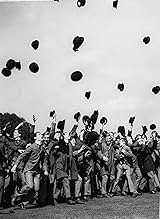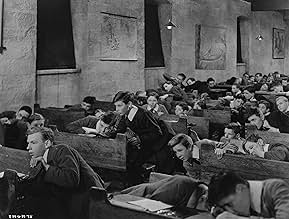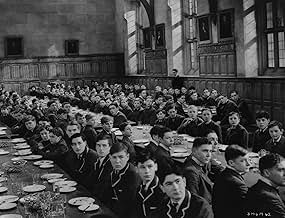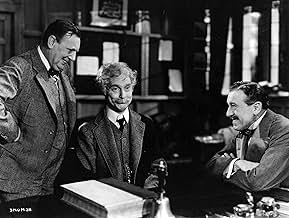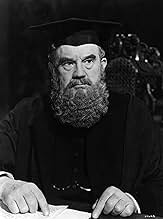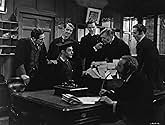IMDb RATING
7.9/10
12K
YOUR RATING
An aged teacher and former headmaster of a boarding school recalls his career and his personal life over the decades.An aged teacher and former headmaster of a boarding school recalls his career and his personal life over the decades.An aged teacher and former headmaster of a boarding school recalls his career and his personal life over the decades.
- Won 1 Oscar
- 6 wins & 8 nominations total
Paul Henreid
- Staefel
- (as Paul Von Hernried)
Edmund Breon
- Colonel Morgan
- (as Edmond Breon)
Ernest Blyth
- Austrian Officer Boarding Train
- (uncredited)
John Blythe
- Boy Calling Assembly
- (uncredited)
Featured reviews
Director Sam Woods (`Kitty Foyle: The Natural History of a Woman,' `King's Row,' `For Whom the Bell Tolls') 1939 film `Goodbye Mr. Chips' features a top-notch performance by Robert Donat as the somewhat stuffy English prep school teacher, Mr. Chippings. Chippings early career difficulties are overcome, as is his shyness after he meets Greer Garson (`Mrs. Miniver') in the Alps while on holiday. Garson is able to show the stodgy Chips how to live life and her effect on him lasts throughout the rest of his life, although Garson is not around for long.
The film uses recurring patterns to show the passage of time, namely the showing of the boys arriving at the school each year in the autumn. These segments often contained little historical snippets between the boys, such as `we now have telephones, do you know how to use one?' and mention of Queen Victoria's death and the remark that `it is going to be strange to have a King.' Other historical comments occurred between the teachers such as the remark on a book by a new author, H.G. Wells and how he will never last because his writing is too fantastic. Sadly, Chip's historical error occurs when he comments to the boys that they will not have to go off to World War I as the war cannot possibly last more than a few weeks. So many of the teachers and students end up losing their lives in the Great War. Some other scenes from this film have been parodied through the years in comedies, most noticeably the scenes in the great hall when the headmasters are speaking to the boys is sent up hilariously by John Cleese in `Monty Python's the Meaning of Life' and the scene where Chips canes an insolent student (it is filmed as a shadow against the wall) is later parodied when a punisher is reprimanded for whipping the shadow, not the victim (my memory is failing me here, but I think this is in 1969s `Take the Money and Run' by Woody Allen, I could be wrong as a part of me also thinks that this could be in Mel Brooks' `Blazing Saddles.')
Donat aptly handles the complex role of Chips through the years, from about his mid-20s until his 80s. This may be one of the earlier movies that so aptly chronicles the life and times of a person through such an expanse of years, Dustin Hoffman in `Little Big Man' also performs n this manner, as does Al Pacino in `The Godfather Trilogy,' albeit over the length of three long movies. Even more outstanding and interesting about Donat and his character is that he covers so much of a common man's existence; Chips is a teacher, not a King, general, messiah or Mafia chieftain.
The film uses recurring patterns to show the passage of time, namely the showing of the boys arriving at the school each year in the autumn. These segments often contained little historical snippets between the boys, such as `we now have telephones, do you know how to use one?' and mention of Queen Victoria's death and the remark that `it is going to be strange to have a King.' Other historical comments occurred between the teachers such as the remark on a book by a new author, H.G. Wells and how he will never last because his writing is too fantastic. Sadly, Chip's historical error occurs when he comments to the boys that they will not have to go off to World War I as the war cannot possibly last more than a few weeks. So many of the teachers and students end up losing their lives in the Great War. Some other scenes from this film have been parodied through the years in comedies, most noticeably the scenes in the great hall when the headmasters are speaking to the boys is sent up hilariously by John Cleese in `Monty Python's the Meaning of Life' and the scene where Chips canes an insolent student (it is filmed as a shadow against the wall) is later parodied when a punisher is reprimanded for whipping the shadow, not the victim (my memory is failing me here, but I think this is in 1969s `Take the Money and Run' by Woody Allen, I could be wrong as a part of me also thinks that this could be in Mel Brooks' `Blazing Saddles.')
Donat aptly handles the complex role of Chips through the years, from about his mid-20s until his 80s. This may be one of the earlier movies that so aptly chronicles the life and times of a person through such an expanse of years, Dustin Hoffman in `Little Big Man' also performs n this manner, as does Al Pacino in `The Godfather Trilogy,' albeit over the length of three long movies. Even more outstanding and interesting about Donat and his character is that he covers so much of a common man's existence; Chips is a teacher, not a King, general, messiah or Mafia chieftain.
10Pelrad
"Mr Chips" is a celebration of the teaching profession. "Chips" finishes teachers' college in England and is almost run over by the students his first day teaching. But he learns how to balance good teaching with the right amount and kind of discipline in order for his students to be guided into a good education. However, he is somewhat shy and almost always in earnest.
"Chips" takes a vacation and meets a woman while doing some hiking. She is his perfect match and they fall in love and marry and she helps him to come out of his shell. He begins cracking jokes that have the students rolling on the desks with laughter. The couple become more than just educators; they begin to care for the children in many other ways.
The film follows "Chips" throughout his growing old. He gives the children morale and courage during the horrors of the War. "Goodbye, Mr. Chips" shows the beauty and rewards of the teaching profession, though it can be very difficult at times. Robert Donat gives one of the greatest acting performances in history. Brilliant! (10 out of 10)
"Chips" takes a vacation and meets a woman while doing some hiking. She is his perfect match and they fall in love and marry and she helps him to come out of his shell. He begins cracking jokes that have the students rolling on the desks with laughter. The couple become more than just educators; they begin to care for the children in many other ways.
The film follows "Chips" throughout his growing old. He gives the children morale and courage during the horrors of the War. "Goodbye, Mr. Chips" shows the beauty and rewards of the teaching profession, though it can be very difficult at times. Robert Donat gives one of the greatest acting performances in history. Brilliant! (10 out of 10)
Goodbye Mr Chips must be one of the best films ever made.
The acting of boys, masters and other characters is superb, as is the capturing of the late Victorian/Edwardian period in England, the joy of 1914 on the declaration of war, followed by the sombre roll-calls of the dead in chapel during the war years.
The character of Chips is an instruction in how someone's life can be transformed for the better by fortuitous events, in this case the meeting on the mountain between Chips and Katherine, which changed him from being a shy but well-meaning schoolmaster who found it difficult to establish a rapport with his pupils and colleagues into someone whose hidden depths and charisma were brought into view by a woman he loved.
This gentle, decent and moving film illustrates, through both Chips and Katherine, the importance of giving of oneself to others who in their turn will benefit as human beings; concepts which might seem outdated in our modern world but remain valuable and timeless.
The acting of boys, masters and other characters is superb, as is the capturing of the late Victorian/Edwardian period in England, the joy of 1914 on the declaration of war, followed by the sombre roll-calls of the dead in chapel during the war years.
The character of Chips is an instruction in how someone's life can be transformed for the better by fortuitous events, in this case the meeting on the mountain between Chips and Katherine, which changed him from being a shy but well-meaning schoolmaster who found it difficult to establish a rapport with his pupils and colleagues into someone whose hidden depths and charisma were brought into view by a woman he loved.
This gentle, decent and moving film illustrates, through both Chips and Katherine, the importance of giving of oneself to others who in their turn will benefit as human beings; concepts which might seem outdated in our modern world but remain valuable and timeless.
Here's another one of those old-fashioned movies in which people are all nice: no villains. It's a refreshing change of pace, once in a while, at least for me.
Sometimes it's relaxing just to just kick back with a story that just makes you feel good, doesn't upset you at any time. There are some touching scenes with some sadness in here, too, however, but the sincere story and great acting make you glad you watched it.
Robert Donat, as Mr. Chippings, is a pleasure to watch, particularly when he plays the character in his declining years. Greer Garson gets equal if not top billing, but that's not right. Her role is not that big in this picture.
Another nice feature you don't see much, at least in post-1960 films - all respectful kids in here, with manners. Nice adults, nice kids, nice story - probably too corny for most people of today in our cynical world. Too bad. Their loss.
Sometimes it's relaxing just to just kick back with a story that just makes you feel good, doesn't upset you at any time. There are some touching scenes with some sadness in here, too, however, but the sincere story and great acting make you glad you watched it.
Robert Donat, as Mr. Chippings, is a pleasure to watch, particularly when he plays the character in his declining years. Greer Garson gets equal if not top billing, but that's not right. Her role is not that big in this picture.
Another nice feature you don't see much, at least in post-1960 films - all respectful kids in here, with manners. Nice adults, nice kids, nice story - probably too corny for most people of today in our cynical world. Too bad. Their loss.
The children attending the Brookfield school are no ordinary English boys; they are the the children of the upper classes of society, who for generations have learned from institutions such as the school represented here. They are molded at places like this fictional one to be leaders of their country. Mr. Chipping is a teacher who gives his life to Brookfield, only to be bypassed when promotions are handed out. His love for the profession and his dedication to the formation of these children are his reasons for living. Most of his own life is spent at the school. Only in times of crisis is Mr. Chipps recognized. Mr. Chipps knows happiness only too briefly. He is extremely lucky when he finds Katherine. One can see the rapport in her, although we never see it explicitly on Chipping's face, maybe because a stiff upper lip that doesn't let him express his true feelings to a woman who adored him from their first encounter. Mr. Chipps lives long enough to learn about the death of his beloved students in several world conflicts. As a father figure, his life is full because the love and admiration the young boys feel for him. The film made Robert Donat a favorite of the movie going public. Mr. Donat goes from being a taciturn person into a jolly old man living on his own because Katherine dies young. The film improves tremendously when Greer Garson appears. Her luminous presence changes the tone of the movie because of her incredible charm. Paul Henreid makes a short appearance as Staefel, the fellow teacher who invites Mr. Chipps to accompany on a vacation trip to Austria. Sam Wood direction pays a close look to detail. The film is a classic and will live forever.
Did you know
- Trivia34-year-old Robert Donat ages 63 years (1870-1933) over the course of this movie. He remarked: "As soon as I put the mustache on, I felt the part, even if I did look like a great Airedale come out of a puddle."
- GoofsMiss Kathy tells Chips that the ballroom in Vienna is where Metternich drew up "the treaty of the five kings" (referring to the Congress of Vienna in 1814 ending the Napoleonic Wars) "nearly 100 years ago." But the montage after Kathy's death makes clear she died before the Boer War (1899) and Queen Victoria's funeral (1901). 100 years after the Congress of Vienna was 1914, the start of World War I when Chips becomes acting headmaster, and Kathy is spoken of as having died long ago.
- Quotes
[dying words]
Mr. Chipping 'Mr. Chips': I thought I heard you saying it was a pity... pity I never had any children. But you're wrong. I have. Thousands of them. Thousands of them... and all boys.
- ConnectionsEdited into Hollywood: The Dream Factory (1972)
- SoundtracksBrookfield School Song
(uncredited)
Music by Richard Addinsell
Lyrics by Eric Maschwitz
Performed by orchestra in opening credits
Sung by male chorus during school assembly and during closing credits
Details
- Release date
- Countries of origin
- Languages
- Also known as
- Goodbye, Mr. Chips
- Filming locations
- Repton School, Repton, Derbyshire, England, UK(Brookfield School)
- Production companies
- See more company credits at IMDbPro
- Runtime1 hour 54 minutes
- Color
- Aspect ratio
- 1.37 : 1
Contribute to this page
Suggest an edit or add missing content



